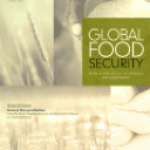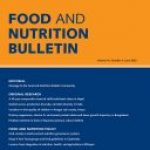Research Area: Gender & Nutrition

Pathways from Agriculture to Nutrition in India: The Role of Women’s Time Trade-Offs and Empowerment
Abstract Agriculture plays a key role in improving nutrition as a significant proportion of the malnourished population lives in rural areas and depends on smallholder agriculture for their sustenance. About 30 percent of the labor force in agriculture in India are women, and they contribute...

Essays On K-12 Education in Developing Countries – Causes, Consequences and Impediments
Abstract This dissertation focusses on the causes and consequences of low human capital accumulation among children and adolescents in developing countries in Asia and Africa. My analysis is divided into three separate papers that explore different aspects of this research agenda. Broadly, chapter 1 of...

Women’s Empowerment in Indian Agriculture: Does Market Orientation of Farming Systems Matter?
Abstract This paper studies the relationship between the Women’s Empowerment in Agriculture Index (WEAI) and market orientation of farm production in India. This is the first time that the WEAI has been used in an Indian agricultural context and the first time that it is...

The Role of Agriculture in Women’s Nutrition: Empirical Evidence from India
Abstract In this paper, we establish a statistically important relationship between household agricultural income and women’s BMI using a five-year panel dataset of rural households drawn from 18 villages across five Indian states. Using within household variation over time, we estimate both the extent to...

Adapting the Women’s Empowerment in Agriculture Index to Specific Country Context: Insights and Critiques from Fieldwork in India
Abstract The Women’s Empowerment in Agriculture Index (WEAI) is a direct, multi-dimensional measure of women’s access to resources and decision-making in various domains of agriculture. However, several challenges characterize its use: adaptation of questionnaires to local agricultural contexts, modifications to index construction once underlying activities and adequacy thresholds are...

Women’s Empowerment and Nutrition Status: The Case of Iron Deficiency in India
Abstract In this paper we study the relationship between women’s empowerment in agriculture and their iron deficiency status in Maharashtra, India. This is the first time the Women’s Empowerment in Agriculture Index (WEAI) has been used in association with explicit measurement of medical biomarkers for...

Nutritional Outcomes of Empowerment and Market Integration for Women in Rural India
Abstract Over half of all women of reproductive age are affected by anaemia in India. In this paper we study the role that both household market integration and women’s empowerment in agriculture can play in determining women’s dietary diversity. Our analysis is based on primary...

Market Access, Production Diversity, and Diet Diversity: Evidence From India
Abstract Background: Recent literature, largely from Africa, shows mixed effects of own-production on diet diversity. However, the role of own-production, relative to markets, in influencing food consumption becomes more pronounced as market integration increases. Objective: This paper investigates the relative importance of two factors –...

Are Women in Rural India Really Consuming a Less Diverse Diet?
Abstract Background: It is widely considered that women have less diverse diets than other household members. However, it has been challenging to establish this empirically since women’s diet diversity is measured differently from that of other household members. Objective: In this article, we compare women’s...

Effects of Short Birth Spacing on Birth-Order Differences in Child Stunting: Evidence from India
Abstract Read a policy brief based on this study. Do firstborn children have a height advantage? Empirical findings have found mostly that, yes, second or higher-order children often lag behind firstborns in height outcomes, especially in developing countries. However, empirical investigations of birth-order effects on...

